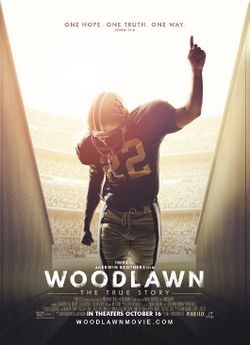Woodlawn (film): Difference between revisions
(→Synopsis: Beginning of revamp. Lots of work to do.) |
|||
| Line 4: | Line 4: | ||
==Synopsis== | ==Synopsis== | ||
The film opens with a montage of familiar news footage from the height of the [[Civil Rights Movement]], focusing on the [[Birmingham Campaign]] with its [[police dogs and firehoses]] but also featuring Governor [[George Wallace]]'s "[[Stand in the schoolhouse door]]" to protest the integration of the [[University of Alabama]]. It then moves forward to the [[1970]] football season opener in which an integrated University of Southern California handily defeated the all-white [[Alabama Crimson Tide football|University of Alabama Crimson Tide]]. Afterwards, Alabama coach [[Bear Bryant]] (John Voight) is shown going to the USC locker room and congratulating their team. | |||
Finally, the film moves forward to [[1973]] at Woodlawn High School, which is still struggling with court-ordered integration. [[Tony Nathan]], a gifted high school football player, and other African-American students desegregate the team. As cross burnings and riots erupt in the city, [[Tandy Gerelds]], the Woodlawn Colonels football coach, struggles to ease racial tensions between his players. It's only when Gerelds allows [[Hank Erwin]], an outsider, to speak to his team that real change begins. Hank, who has been radically affected by the message of hope and love he experienced at a Christian revival meeting, tells the players a "better way" is possible through following Jesus. More than 40 players, nearly the entire team, black and white, give their lives over to Jesus Christ and the spiritual change has a profound effect on the coach, the school and the community.<!-- ref>{{cite web|url=http://woodlawnmovie.com/about |title=Woodlawn | About the Movie |publisher=Woodlawnmovie.com |date=2015 |accessdate=2015-08-21}}</ref --> | |||
==Cast== | ==Cast== | ||
Revision as of 08:45, 28 October 2015
Woodlawn is a 2015 Christian sports drama film directed by the Erwin Brothers, Andrew and Jon Erwin. The film, which is based on the true story of Tony Nathan and his time at Woodlawn High School, stars Sean Astin, Nic Bishop, Caleb Castille, Sherri Shepherd and Jon Voight. It was produced by Kevin Downes, Provident Films and Pure Flix Entertainment and was released on October 16, 2015.
Synopsis
The film opens with a montage of familiar news footage from the height of the Civil Rights Movement, focusing on the Birmingham Campaign with its police dogs and firehoses but also featuring Governor George Wallace's "Stand in the schoolhouse door" to protest the integration of the University of Alabama. It then moves forward to the 1970 football season opener in which an integrated University of Southern California handily defeated the all-white University of Alabama Crimson Tide. Afterwards, Alabama coach Bear Bryant (John Voight) is shown going to the USC locker room and congratulating their team.
Finally, the film moves forward to 1973 at Woodlawn High School, which is still struggling with court-ordered integration. Tony Nathan, a gifted high school football player, and other African-American students desegregate the team. As cross burnings and riots erupt in the city, Tandy Gerelds, the Woodlawn Colonels football coach, struggles to ease racial tensions between his players. It's only when Gerelds allows Hank Erwin, an outsider, to speak to his team that real change begins. Hank, who has been radically affected by the message of hope and love he experienced at a Christian revival meeting, tells the players a "better way" is possible through following Jesus. More than 40 players, nearly the entire team, black and white, give their lives over to Jesus Christ and the spiritual change has a profound effect on the coach, the school and the community.
Cast
- Sean Astin as Hank Erwin
- Nic Bishop as Coach Tandy Gerelds
- Caleb Castille as Tony Nathan
- C. Thomas Howell as Coach Shorty White
- Sherri Shepherd as Momma Nathan
- Kevin Sizemore as Coach Jerry Stearns
- Jon Voight as Bear Bryant
Reception
Box office
On the film's opening day it grossed $1.4 million, above studio expectations. In its opening weekend, it grossed $4.1 million, finishing 9th at the box office.
Critical response
Woodlawn has received positive reviews from critics. On Rotten Tomatoes, the film has a rare rating of 100%, based on 5 reviews, with an average rating of 7.5/10. On CinemaScore, audiences gave the film an average grade of "A+" on an A+ to F scale.
